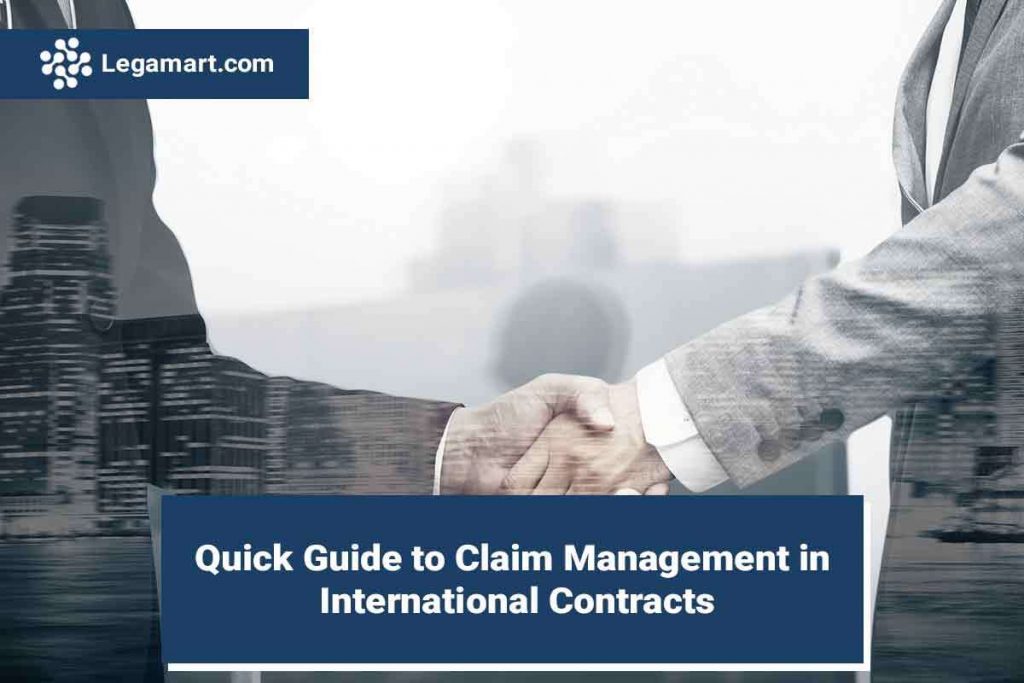Introduction
A contractual breach and a claim arising from it are a likely by-product of any contract between two (or more) parties. Such a circumstance is especially inevitable when one of the parties is a large company. It is simply due to the sheer volume of contracts and other legal documentation handled by it and the associated risks. Therefore, an effective claim management process, a core aspect of Legal Practice & Specialization, becomes essential for companies and individuals to tackle this seemingly universal problem. In this article, we will understand the fundamentals of claim management in international contracts: what it entails, its benefits, and how you can avail of these services. But before diving into the details, let us first understand the meanings of a few essential terms.
What is an International Contract?
An international contract is an agreement enforceable by law that forges a legal relationship between two or more parties belonging to different countries or the same country, such that the consequent legal effects are produced outside the domestic territory.
For example, construction contracts such as FIDC contracts wherein the builder and the project lands are located in different countries are international contracts. It is worth noting that the Federation of Consulting Engineers (FIDC), founded in 1913 and headquartered in Geneva, Switzerland, has been recognized as the pioneer in providing standard templates for international construction contracts.
What is a Claim?

A claim refers to a demand or assertion made by one of the parties to a contract. It is usually made for monetary compensation as a matter of right and arises from any actual or alleged contractual liability. Such liability may arise due to any deviation, defect or delay concerning the agreed terms or unforeseen circumstances.
Any claim arising from a contract, whether domestic or international, poses a financial and reputational risk to the company/individual and must therefore be handled promptly.
What is Claim Management in International Contracts?
Claim management is the term used to collectively describe advice or services rendered by lawyers, law firms, specialized third-party administrators, or agencies in respect of claims for compensation, reparation, restitution, or any other remedy for financial loss or breach of a contractual obligation.
This process is used to discern deviations from contractually agreed terms and sets out the responsibilities of each of the parties based on the claims made therein and ensures compliance with the same. It also involves participation in negotiations and dispute resolution mechanisms, including litigation in courts, arbitration, and mediation.
Claim management in international contracts involves cross-functional support of multiple stakeholders and steps that may be bound by specific timelines, especially in the case of processing insurance claims.
Elements of Claim Management in International Contracts

Stage I: Pre-Contractual Breach
The world today has come a long way from the old days when parties with their respective lawyers would commence strategizing only once contractual breaches occurred and subsequent litigations began.
As the age-old adage goes, “Prevention is better than cure.” A key element in managing claims is to avoid them in the first place. Thus, the first step involved in claim management can be summarized below:
Analysis and Diagnosis
As a rule of thumb, it is advisable to have a legal specialist look at the various contracts that an individual/company may be required to execute. It allows them to analyze and scrutinize each word and weed out any loopholes and triggers that may be harmful. It is also an excellent opportunity for the client to understand their essential obligations and rights to maximize gains and assess risks associated with a particular contract.
Such preventative measures provide clarity and avoid conflicts, contributing towards stable and profitable contractual endeavors.

Stage II: On the Occurrence of the Breach
Once a breach occurs, it is advisable to seek professional assistance at the earliest opportunity to limit the damage as early as possible. It is critical to gather information and evidence regarding an event of default/breach at the initial stage to prevent the loss of essential information that may prove costly once a trial/litigation commences. It is especially true in claim management of insurance and construction contracts.
Advise
At this stage, a lawyer determines why a claim has arisen and the viability of the same. Generally, after considering all the factors, the client is likely to be advised to pursue an early settlement as that is the cheapest and least time-consuming option leading to a win in the matter and early closure for all the parties involved.
Stage III. Post Contractual Breach
It is the final stage and is pursued when the initial settlement talks between stakeholders fail and it has been decided to contend the claim all the way through.
Investigation
It involves a two-step process: claim identification and claim quantification. The lawyer/claim manager will again review the contract and other legal documents under which the alleged breach occurred to gauge the scope and quantum of the reliefs to be sorted and to corroborate evidence. Accordingly, the lawyer may prepare a statement of claim, costs/damages, and other documents to be presented in a court of law.
Resolution of Claim
It goes without saying that the longer a dispute persists, the more expensive and disruptive it is. Therefore, legal professionals should make an effort to settle disputes using negotiation and other alternative dispute resolution mechanisms, such as arbitration and mediation, before pursuing full-fledged litigations in a court of law. Choosing one dispute resolution mechanism over another often depends on the time and money a party is willing to spend on a claim.
Benefits of Claim Management

There are several advantages to managing claims professionally. A snapshot of the most important benefits follows:
Clarity and Stability
As seen above, the best way to manage a claim is to have no claims to manage. An essential aspect of claim management is ensuring that the agreements must be executed without any superfluous or confusing language. It helps avoid ambiguities and misunderstandings regarding the interpretation of contracts and ensures that all stakeholders know their rights and responsibilities.
Effective Strategization
Seeking professional help for claim management ensures that all the bases are effectively covered at every step to tackle any issues that may arise later.
Risk Management
Claim Managers can identify early warning signs and opportunities in time to leave room for making changes that would be in the best interest of a company/individual. Continuous and comprehensive risk monitoring is an effective way of ensuring security and stability.
Cost Effective
Effective risk management ensures that unnecessary litigations and their legal costs are avoided. Further, accurate assessment of claims safeguards that an insurance company does not overpay or an individual is not underpaid.
Increased Customer Satisfaction
Decreased turn-around time (TAT), comprehensive claim management, and consistency boost customer satisfaction ratings.
Reduced Errors
Risk management aids in identifying fraudulent and suspicious documents/claims and reduces errors made during the long and tedious claim process.
Increased Profitability
The faster turn-around time, higher customer satisfaction ratings, and reduced delays help to bolster a company’s profits.
Legal Expertise
Seeking the help of lawyers ensures that a company/individual is up to date with legal and regulatory developments. LegaMart provides an easy fix for this, and you can drop any queries related to contract management or any other general legal issues on our Community Page. Our global lawyers will reach out to you at the earliest.
Who Provides Claim Management?

Claim management is a cross-functional service, and different stakeholders may be involved at different stages. Such services may be provided by an individual lawyer, a law firm specializing in claims, a third-party administrator, or even a claim management firm.
Finding the right person to manage your claim, especially when it is an international contract, can be overwhelming. No worries. The solution is just a few clicks away. Visit LegaMart Directory and handpick a lawyer tailored to your needs today.
Conclusion
Conflicts and the resultant claims are a risk we undertake each time we sign the dotted line of a contract. With effective claim management processes backed by professionals in the legal field, the degree of the risk we take can be managed and mitigated effectively and often even prevented altogether.
LegaMart is a global legal platform designed to connect individuals, startups, and businesses with qualified lawyers across jurisdictions. With a mission to simplify cross-border legal services, LegaMart provides users with access to a diverse network of vetted legal professionals who specialize in areas such as international law, corporate law, immigration, dispute resolution, and more.
By leveraging technology and user-friendly tools, LegaMart allows clients to search for lawyers by country, language, or legal expertise, submit their legal queries, and receive tailored legal solutions in a streamlined, efficient manner. The platform serves as a bridge between legal professionals and clients who need multilingual, multi-jurisdictional support — especially in today’s increasingly globalized legal landscape.
Whether you’re an entrepreneur launching a business abroad, an individual dealing with immigration paperwork, or a company navigating cross-border compliance, LegaMart aims to make legal help more accessible, transparent, and collaborative.




